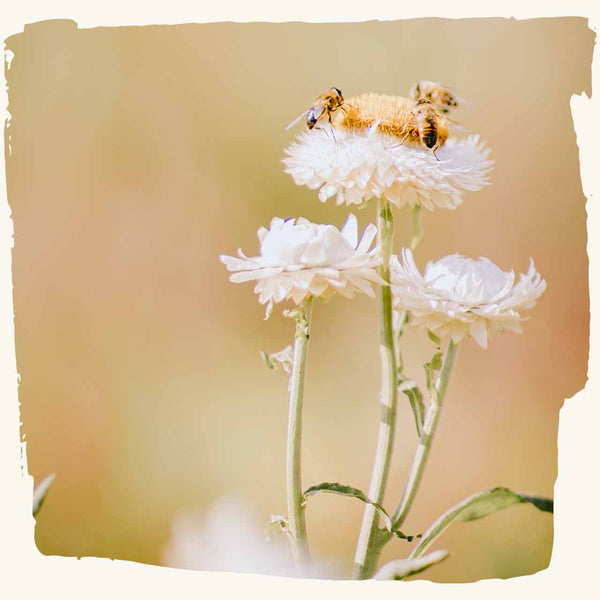There are around 561 bee species in Germany - over 50 percent of which are threatened. According to the German Beekeepers Association, the number of bee colonies has fallen from 2.5 million in 1952 to less than a million today.

Causes of bee deaths
There are several causes of bee deaths. On the one hand, there are viruses that affect bees, and on the other hand, the much larger part, there are human-caused reasons. Industrial agriculture plays a big role here. Through agriculture we are destroying important habitats for insects and the expansion of monocultures (growing the same plant species on one area of land) means there is an acute lack of food for the small animals.
Agriculture also involves the use of toxic pesticides. We use them under the code name “plant protection products” – but the pesticides are deadly for bees.
This is how you can help the bees
With just a little effort you can help the bees and give them a better habitat.
- Provide pollination opportunities for bees: If you have a garden, sow bee-friendly plants and let them grow into a wildflower meadow. Not only does it look beautiful, but it is a true pollinator's dream for the bees.
- You can also help on a balcony: choose flowers with as long a blooming time as possible. This is how bees find food from spring to autumn. Even planted culinary herbs on the balcony or window sill help and are good for the bees.
- Avoid pesticides: pesticides, weed and pest control products are absolutely harmful to bees. These include pesticides, herbicides and biocides. These agents can be fatal to bees and are among the main causes of bee deaths worldwide. Therefore, avoid plant protection entirely or choose ecologically valuable products. You should inform yourself beforehand or seek advice directly.


- Nesting quarters for insects: As already mentioned, in addition to pesticides, a lack of habitat for bees is one of the causes of bee deaths. To provide nesting quarters for insects, you don't necessarily need a lot of space on your balcony or garden. A hole drilled in wood or a pot filled with sand serves as shelter. But there are also larger, ready-made nesting boxes, so-called insect hotels.
- Take on a bee sponsorship: You can symbolically sponsor a bee by donating to an organization. In this way you support regional beekeeping or projects for planting wildflower meadows. This is a good solution if you don't have the space or time for your own flower meadow.
-
Become a beekeeper yourself: “ Urban beekeeping” is a trend in many cities. This is the urban keeping of bees. Since bees like it warm, they feel particularly comfortable in larger cities. Many large companies have already built bee houses on their roofs. The Munich police, for example, have been able to buy police honey since 2014.
Smaller companies also offer private individuals beekeeping courses and so-called bee boxes so that they can open a small beekeeping business on their own balcony.
With these tips you can help the bees and contribute a small part with a big impact to saving the bees.

Sources:
- https://www.greenpeace.de/engagieren/kids/bienen?BannerID=0322000015001483&gclid=Cj0KCQjwspKUBhCvARIsAB2IYuvJi2qBi93GFFvx3bRJoER7zI9Kz8-PTe7zcw6qgBpUGHnWJ1x5e90aAueEEALw_w cB
- https://www.welt.de/forschung/umwelt/article144151778/Sterben-die-Bienen-aus-denken-auch-menschen.html
- https://www.weltbienentag.de/bienenschutz/
- https://www.bee-careful.com/de/initiative/neuer-trend-im-focused-urban-beekeeping/
- https://www.stadtbienen.org/
- https://deutscherimkerbund.de/

















